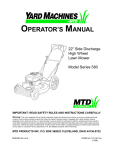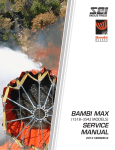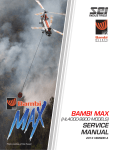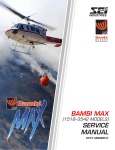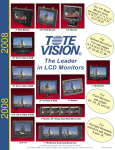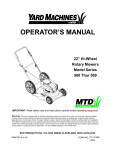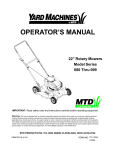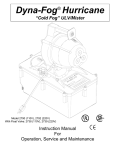Download MTD 050 thru 062 Operator`s manual
Transcript
OPERATOR’S MANUAL 20” and 22” ROTARY MOWERS Model Series 050 thru 062 IMPORTANT: READ SAFETY RULES AND INSTRUCTIONS CAREFULLY Warning: This unit is equipped with an internal combustion engine and should not be used on or near any unimproved forestcovered, brush-covered or grass-covered land unless the engine’s exhaust system is equipped with a spark arrester meeting applicable local or state laws (if any). If a spark arrester is used, it should be maintained in effective working order by the operator. In the State of California the above is required by law (Section 4442 of the California Public Resources Code). Other states may have similar laws. Federal laws apply on federal lands. A spark arrester for the muffler is available through your nearest engine authorized service dealer or contact the service department, P.O. Box 368022 Cleveland, Ohio 44136-9722. MTD PRODUCTS INC. P.O. BOX 368022 CLEVELAND, OHIO 44136-9722 PRINTED IN U.S.A. FORM NO.770-8550A (10/97) SECTION 1: IMPORTANT SAFE OPERATION PRACTICES WARNING: THIS SYMBOL POINTS OUT IMPORTANT SAFETY INSTRUCTIONS WHICH, IF NOT FOLLOWED, COULD ENDANGER THE PERSONAL SAFETY AND/OR PROPERTY OF YOURSELF AND OTHERS. READ AND FOLLOW ALL INSTRUCTIONS IN THIS MANUAL BEFORE ATTEMPTING TO OPERATE YOUR LAWN MOWER. FAILURE TO COMPLY WITH THESE INSTRUCTIONS MAY RESULT IN PERSONAL INJURY. WHEN YOU SEE THIS SYMBOL, HEED ITS WARNING. WARNING: The Engine Exhaust from this product contains chemicals known to the State of California to cause cancer, birth defects or other reproductive harm. DANGER: Your lawn mower was built to be operated according to the rules for safe operation in this manual. As with any type of power equipment, carelessness or error on the part of the operator can result in serious injury. This lawn mower is capable of amputating hands and feet and throwing objects. Failure to observe the following safety instructions could result in serious injury or death. 1. GENERAL OPERATION • Always wear safety glasses or safety goggles during operation or while performing an adjustment or repair, to protect eyes from foreign objects that may be thrown from the machine in any direction. • Read this operator’s manual carefully in its entirety before attempting to assemble this machine. Read, understand, and follow all instructions on the machine and in the manual(s) before operation. Be completely familiar with the controls and the proper use of this machine before operating it. Keep this manual in a safe place for future and regular reference and for ordering replacement parts. • Thoroughly inspect the area where the equipment is to be used. Remove all stones, sticks, wire, bones, toys and other foreign objects which could be picked up and thrown by the mower in any direction and cause serious personal injury to the operator or any others allowed in the area. Plan your mowing pattern to avoid discharge of material toward roads, sidewalks, bystanders and the like. To help avoid a thrown objects injury, keep children, bystanders and helpers at least 75 feet from the mower while it is in operation. • Your rotary mower is a precision piece of power equipment, not a plaything. Therefore, exercise extreme caution at all times. Your unit has been designed to perform one job: to mow grass. Do not use it for any other purpose. • Never allow children under 14 years old to operate a power mower. Children 14 years old and over should only operate mower under close parental supervision. Only responsible individuals who are familiar with these rules of safe operation should be allowed to use your mower. • Do not put hands or feet near or under rotating parts. Keep clear of discharge opening at all times as the rotating blade can cause injury. • Many injuries occur as a result of the mower being pulled over the foot during a fall. Do not hang on to the mower if you are falling; release the handle immediately. • Keep the area of operation clear of all persons, particularly small children and pets. Stop engine when they are in the vicinity of your mower to help prevent blade contact or thrown object injury. Although the area of operation should be completely cleared of foreign objects, an object may have been overlooked and could be accidentally thrown by the mower in any direction and cause serious personal injury to the operator or any others allowed in the area. • Never pull the mower toward you while you are walking. If you must back the mower away from a wall or obstruction first look down and behind, and then follow these steps: • Step back from the mower to fully extend your arms. • Be sure you are well balanced with sure footing. • Wear sturdy, rough-soled work shoes and closefitting slacks and shirts. Shirts and pants that cover the arms and legs and steel-toed shoes are recommended. Do not wear loose fitting clothes or jewelry. They can be caught in moving parts. Never operate a unit in bare feet, sandals, slippery or light weight (e.g. canvas) shoes. • Pull the mower back slowly, no more than half way toward you. • Repeat these steps as needed. • Do not operate the mower while under the influence of alcohol or drugs. 2 • Always be sure of your footing. A slip and fall can cause serious personal injury. If you feel you are losing your balance release the blade control handle immediately and the blade will stop in less than 3 seconds. • Do not engage the self-propelled mechanism on units so equipped while starting engine. • The blade control handle is a safety device. Never attempt to bypass its operation. Doing so makes the safety device inoperative and may result in personal injury through contact with the rotating blade. The blade control handle must operate easily in both directions and automatically return to the disengaged position when released. DO NOT: • Do not mow near drop-offs, ditches or embankments. The operator could lose footing or balance. • Never operate the mower in wet grass. Always be sure of your footing. A slip and fall can cause serious personal injury. Keep a firm hold on the handle and walk, never run. If you feel you are losing your footing, RELEASE THE BLADE CONTROL HANDLE IMMEDIATELY and the blade will stop rotating within three seconds. • Do not mow slopes greater than 15 degrees as shown on the slope gauge. • Do not mow on wet grass. Reduced footing could cause slipping. 3. CHILDREN • Mow only in daylight or good artificial light. Tragic accidents can occur if the operator is not alert to the presence of children. Children are often attracted to the mower and the mowing activity. Never assume that children will remain where you last saw them. • Stop the blade when crossing gravel drives, walks or roads. • If the equipment should start to vibrate abnormally, stop the engine and check immediately for the cause. Vibration is generally a warning of trouble. • Keep children out of the mowing area and under the watchful care of a responsible adult other than the operator. • Shut the engine off and wait until the blade comes to a complete stop before removing the grass catcher or unclogging the chute. The cutting blade continues to rotate for a few seconds after the engine is shut off. Never place any part of the body in the blade area until you are sure the blade has stopped rotating. • Be alert and turn mower off if a child enters the area. • Before and while moving backwards, look behind and down for small children or other objects. • Never allow children under age 14 to operate the mower. Children 14 years of age and above should read and understand the operation instructions and safety rules in this manual. • Never operate mower without proper guards, grass catcher, plates or other safety protective devices in place. • Use extreme care when approaching blind corners, shrubs, trees, or other objects that may obscure your vision of a child or hazard. • Muffler and engine become hot and can cause a burn. Do not touch. • Only use accessories approved for this machine by the manufacturer. Read, understand, and follow all instructions provided with the approved accessory. 4. SERVICE • Use extreme care in handling gasoline and other fuels. They are extremely flammable and the vapors are explosive. • If situations occur which are not covered in this manual, use care and good judgment. Contact your dealer for assistance. Telephone 1-800-8007310 for the name of your nearest dealer. • Use only an approved gasoline container. • Never remove gas cap or add fuel while the engine is running. Allow engine to cool at least two minutes before refueling. 2. SLOPE OPERATION • Replace gasoline cap securely and wipe off any spilled gasoline before starting the engine as it may cause a fire or explosion. For your safety, use the slope gauge included as part of this manual to measure slopes before operating this unit on a sloped or hilly area. If the slope is greater than 15 degrees as shown on the slope gauge, do not operate this unit on that area or serious injury could result. • Extinguish all cigarettes, cigars, pipes and other sources of ignition. • Never refuel machine indoors because flammable vapors will accumulate in the area. DO: • Mow across the face of slopes; never up and down. Exercise extreme caution when changing direction on slopes. • Never store the machine or fuel container inside where there is an open flame or spark such as a gas water heater, space heater, or furnace. • Watch for holes, ruts, hidden objects, or bumps. Tall grass can hide obstacles. • Never run an engine inside a closed area. 3 • After striking a foreign object, stop the engine, remove the wire from the spark plug, and thoroughly inspect the mower for any damage. Repair the damage before starting and operating the mower. • To reduce fire hazard, keep mower free of grass, leaves, or other debris build-up. Clean up oil or fuel spillage. Allow mower to cool at least 5 minutes before storing. • Before cleaning, repairing, or inspecting, make certain the blade and all moving parts have stopped. Disconnect the spark plug wire, and keep the wire away from the spark plug to prevent accidental starting. • Never attempt to make a wheel or cutting height adjustment while the engine is running. • Grass catcher components are subject to wear, damage and deterioration, which could expose moving parts or allow objects to be thrown. For safety protection, frequently check components and replace with manufacturer’s recommended parts, when necessary. • Check the blade and engine mounting bolts at frequent intervals for proper tightness. Also, visually inspect blade for damage (e.g., bent, cracked or worn). Replace with blade which meets original equipment specifications listed in this manual. • Mower blades are sharp and can cut. Wrap the blade(s) or wear gloves, and use extra caution when servicing them. • Keep all nuts, bolts, and screws tight to be sure the equipment is in safe working condition. • Do not change the engine governor setting or overspeed the engine. Excessive engine speeds are dangerous. • Never tamper with safety devices. Check their proper operation regularly. WARNING - YOUR RESPONSIBILITY: Restrict the use of this power machine to persons who read, understand and follow the warnings and instructions in this manual and on the machine. Figure 1 Safety Labels Found On Lawn Mower 4 SLOPE GAUGE SIGHT AND HOLD THIS LEVEL WITH A VERTICAL TREE A POWER POLE A CORNER OF A BUILDING OR A FENCE POST OPE A 15 ° SL 5 USE THIS PAGE AS A GUIDE TO DETERMINE SLOPES WHERE YOU MAY NOT OPERATE SAFELY. FO OTT LD O ND G NTIN PRE SE , RE ED L INE 15° WARNING Do not mow on inclines with a slope in excess of 15 degrees (a rise of approximately 2-1/2 feet every 10 feet). A riding mower could overturn and cause serious injury. If operating a walk-behind mower on such a slope, it is extremely difficult to maintain your footing and you could slip, resulting in serious injury. Operate RIDING mowers up and down slopes, never across the face of slopes. Operate WALK-BEHIND mowers across the face of slopes, never up and down slopes. CUT ALONG DOTTED LINE TO REMOVE SLOPE GAUGE SECTION 2: CONTENTS OF HARDWARE PACK Remove this sheet from your operator’s manual and lay the hardware on the illustration for identification purposes. After Assembly, keep the Slope Gauge which is on the reverse side of this sheet for future use. (Hardware pack may contain extra items which are not used on your unit. Part numbers are shown in parentheses.) A B ATTACHING THE LOWER HANDLE ATTACHING THE UPPER HANDLE Split Washers 5/16” I.D. (736-0119) Hex Bolts 3/8-24 x 1 1/2” Long (710-0459) Curved Hex Nuts Head Bolts 5/16-18 Thread (710-1250) (712-0267) Spacers 3/8” I.D. x 7/8” O.D. (750-0910) C ATTACHING THE STARTER ROPE Cupped Washers 3/8” I.D. x 7/8” O.D. (736-0105) Hex Lock Nuts 3/8-24 Thread (712-0355) D SECURING THE CABLE E INSTALLATION OF WHEELS Axle Bolts Qty. 4 (738-0533) Cable Ties -- Qty. 3 (726-0240) Cupped Washers 3/8” I.D. x 1-1/8” O.D. (736-0331) Cupped Washers 3/8” I.D. x 7/8” O.D. (736-0105) Hex Nuts 3/8-16 Thread (712-0798) 6 Rope Guide (710-1205) Hex Lock Nut 1/4-20 Thread (712-0324) SECTION 3: FINDING YOUR MODEL NUMBER This Operator’s Manual is an important part of your new walk behind. It will help you assemble, prepare and maintain your walk behind. Please read and understand what it says. Before you start to prepare your walk behind for its first use, please locate the model plate and copy the information from it in this Operator’s Manual. The information on the model plate is very important if you need help from your dealer or the MTD customer support department. • Every walk behind has a model plate. You can locate it by standing behind the unit in the operating position and looking down at the rear of the deck. • The model plate will look like Figure 2. This is where your model number will be. XXX-X-XXX-X-XXX XXXXXXXXXXX This is where your serial number will be. Copy the model number here: MTD PRODUCTS INC CLEVELAND, OHIO 44136 Copy the serial number here: Figure 2 SECTION 4: CALLING CUSTOMER SUPPORT If you are having difficulty assembling this product or if you have any question regarding the controls, operation or maintenance of this unit, please call the Customer Support Department. You can reach them by calling: 1-800-800-7310 Before you call, make sure that you have your model and serial numbers ready. By having the model and serial numbers ready, you help the Customer Support Representative give you faster service. To find your unit’s model and serial number, see SECTION 2: FINDING YOUR MODEL NUMBER. SECTION 5: UNPACKING TO REMOVE UNIT FROM CARTON DISCONNECT SPARK PLUG WIRE 1. Remove staples, break glue on top flaps, or cut tape at carton end and peel along top flap to open carton. 2. Remove loose parts if included with unit (i.e., owner’s manual, etc.). 3. Cut along dotted lines and lay carton down flat. 4. Remove packing material. 5. Slide unit out of carton. Check carton thoroughly for loose parts. Before setting up your lawn mower, disconnect the spark plug wire from the spark plug, and ground it against the engine. See Figure 3. Spark Plug Retaining Post Spark Plug “V” Slot on Engine TOOLS REQUIRED FOR ASSEMBLY Spark Plug Wire (1) 1/2" Wrench (2) 9/16" Wrenches (1) Phillips Screwdriver (1) 3/4" or Adjustable Wrench (Two 6" Adjustable Wrenches may be used instead of the above.) Tecumseh Engines Briggs & Stratton Engines Figure 3 7 SECTION 6: ASSEMBLY INSTRUCTIONS IMPORTANT: This unit is shipped WITHOUT 7. Repeat steps 4 through 6 to attach the other side of the handle. GASOLINE or OIL. After assembly, service engine with gasoline and oil as instructed in the separate engine manual packed with your unit. 8. Tighten both hex bolts and nuts securely. ATTACHING THE UPPER HANDLE (Hardware B) NOTE: Reference to right or left hand side of the mower is observed from the operating position. This owner’s guide covers various models of mowers. Follow only the instructions which pertain to your unit. Lower Handle Hex Nut Split Washer Crowned Side Curved Head Bolt Cupped Side Cupped Washer Notch Figure 5 1. Place the upper handle in position over the lower handle. The hole in the side of the blade control handle (attached to the upper handle) must be on the left side. Hex Lock Nut Two Spacers Hex Bolt Cupped Washer Cupped Washer 2. Secure the upper handle to lower handle using the curved head bolts, split washers and hex nuts as shown in Figure 5. The head of the carriage bolts go on the outside of the handle. Use This Hole Figure 4 ATTACHING THE CONTROL BOX One end of the brake cable is attached to the engine. The other end is attached to the control box. Attach the control box to the upper handle as follows. ATTACHING THE LOWER HANDLE (Hardware A) 1. Raise the rear of the deck and block securely. 2. Place one cupped washer on each hex bolt 1-1/ 2" long (crowned side of washer goes against the head of the hex bolt). “Z” End of Brake Cable Hole in Blade Control Handle 3. Insert the ends of the lower handle through the slots in the rear of the deck. NOTE: It is helpful to have another person hold the handle in position as you continue. 4. Place two spacers between the bottom hole in lower handle and bottom inside hole of the deck. See Figure 4. Use a screwdriver to pry the handle away from the deck if necessary. Plastic Fitting 5. Using a screwdriver, line up the bottom inside hole in the deck, the spacers and the bottom hole in the handle, then insert hex bolt as shown from the outside of the deck. Control Box 6. Secure with cupped washer (cupped side against the handle) and hex lock nut. Do not tighten at this time. Figure 6 8 NOTE: If the control handle is disassembled from the upper handle for any reason, assemble the control handle by inserting the ends into the holes on each side of the upper handle. The hole in the control handle must be on the left side of the upper handle, and control handle must touch the upper handle when engaged (squeezed against the upper handle). 1. Remove the truss machine screw and hex lock nut from the middle of the control box using a phillips screwdriver. Place your finger over the hex lock nut to hold it inside the control box so you can unscrew the truss machine screw. A B Post on Cable Tie 2. Make certain the blade control handle is on top of the upper handle. Figure 8 1. Insert posts on cable ties into holes provided on the inside of the handle, one on the upper handle and two on the lower handle. The holes may be either on the inside or outside of the handles. See Figure 8A. 3. Route the control box (with cable attached) under the lower handle. 4. Holding the control box near the left side of the upper handle (control box must be inside the handle), hook the “Z” end of the brake cable into the control handle from the outside to the inside. See Figure 6 and Figure 7. 2. Secure the cable with the cable ties. Trim excess ends of cable ties. See Figure 8B. INSTALLATION OF WHEELS (Hardware E) End of Control Handle Front Wheel Hex Lock Nut Truss Machine Screw Axle Bolt Smaller Cupped Washer Use These Holes for Front Wheels Larger Cupped Washer Hex Nut Figure 9 The three holes provide three cutting heights for your mower. Use the same hole location for all four wheels when assembling. If wheels are to be assembled in the lowest cutting position (highest hole in the deck), refer to the note below. Figure 7 5. Place the control box on the upper handle just below (touching) the end of the control handle as shown in Figure 7. Secure with hardware removed in step one by placing hex lock nut into the indent on the inside of the control box. Screw the truss machine screw into the hex lock nut. If your mower has two sets of holes (see Figure 9), the front wheels must be assembled in one of the three holes nearest the front of the deck. The rear wheels must be assembled in one of the three holes nearest the rear of the deck. To assemble the wheels: (See Figure 9). 1. Block up the mower securely. SECURING THE CABLE (Hardware D) Secure the cable to the left side of the handle as follows. WARNING: When attaching the control cable, the cable must be routed to avoid contact with all sharp edges and hot surfaces to prevent damage to the cable, which will render the controls inoperative. 2. Place axle bolt through wheel. (Hub side of wheel must face deck.) 9 2. Place the rope guide around the starter rope, so the opening in the rope guide is toward the front of the mower as shown. Insert the rope guide into the right side of the handle, and secure with hex lock nut. See Figure 10. 3. Place one smaller cupped washer on axle bolt, with the cupped side of washer toward the deck (away from wheel). NOTE: If the lowest cutting position (highest hole in the deck) is used, it is necessary to place the larger washer on the outside of the deck and the smaller washer on the inside. FINAL ASSEMBLY OF MOWER 4. Secure wheel to deck with one larger cupped washer on the inside of the deck (cupped side against the deck) and hex nut. Tighten securely. 5. Assemble the other wheels in the same manner. Remove the blocks. Chute Deflectable ATTACHING THE STARTER ROPE (Hardware C) Shipping Chute Retainer Hex Nut Figure 11 1. The chute deflector on your mower is held in an upright position by a retainer for shipping purposes only. This shipping retainer must be removed and discarded before the mower is put into operation. See Figure 11. To remove the shipping chute retainer, move the spring-loaded chute toward the engine by pushing above the retainer. Remove the retainer and carefully lower the chute into operating position, keeping fingers out of the way. Rope Guide Starter Rope Figure 10 1. The starter rope is inside the top of the engine. With the spark plug wire disconnected and grounded, depress the blade control handle and pull the rope out of the engine. 2. Make certain all nuts and bolts are tightened securely. SECTION 7: CONTROLS BLADE CONTROL HANDLE WARNING: This control mechanism is a safety device. Never attempt to bypass its operations. Blade Control Handle The blade control handle is located on the upper handle of the mower. See Figure 12. The blade control handle must be depressed in order to operate the unit. Release the blade control handle to stop the engine and blade. Recoil Starter WARNING: The blade will be rotating whenever the engine is running. RECOIL STARTER The recoil starter handle is attached to the handle and is used to start the engine. See Figure 12. Figure 12 10 SECTION 8: OPERATION Keep hands and feet away from the chute area on cutting deck. See Figure 1, Warning Label. 5. Pull rope with a rapid, continuous, full arm stroke. Keep a firm grip on starter handle. Return it slowly to the rope guide. The operation of any lawn mower can result in foreign objects being thrown into the eyes, which can result in severe eye damage. Always wear safety glasses or eye shields. We recommend wide vision safety mask for over spectacles or standard safety glasses. NOTE: If any problems are encountered, refer to the Trouble Shooting Guide on page 14. TO STOP ENGINE AND BLADE 1. Release the blade control handle to stop the engine and blade. GAS AND OIL FILL-UP WARNING: The blade continues to Service the engine with gasoline and oil as instructed in the separate engine manual packed with your mower. Read instructions carefully. rotate for a few seconds after the engine is shut off. WARNING: Never fill fuel tank indoors, 2. Disconnect the spark plug wire and ground it against the engine to prevent accidental starting while equipment is unattended. with engine running or until the engine has been allowed to cool for at least two minutes after running. USING YOUR ROTARY MOWER TO START ENGINE AND ENGAGE BLADE Be sure that lawn is clear of stones, sticks, wire, or other objects which could damage lawn mower or engine. Such objects could be accidently thrown by the mower in any direction and cause serious personal injury to the operator and others. NOTE: Your engine is a constant speed engine, which is set at full throttle for best performance. 1. Attach spark plug wire securely to spark plug. 2. Prime engine as instructed in the separate engine manual. Blade Control Handle For best results, do not cut wet grass because it tends to stick to the underside of the mower, preventing proper discharge of grass clippings, and could cause you to slip and fall. New grass or thick grass may require a narrower cut. The best mowing pattern is one that allows the clippings to discharge towards the uncut part of the lawn. This permits recutting of the clippings to further pulverize them. When cutting high weeds, discharge towards cut portion, then recut at right angles to first direction. For a healthy lawn, never cut off more than onethird of the total length of the grass. Lawn should be cut in the fall as long as there is growth. Recoil Starter Handle WARNING: If you strike a foreign Figure 13 object, stop the engine. Remove wire from spark plug, thoroughly inspect the mower for any damage, and repair the damage before restarting and operating the mower. Extensive vibration of the mower during operation is an indication of damage. The unit should be promptly inspected and repaired. 3. Standing behind the unit, depress the blade control handle and hold it against the upper handle as shown in Figure 13. 4. Grasp starter handle and pull rope out slowly until engine reaches start of compression cycle (rope will pull slightly harder at this point). Let the rope rewind slowly. 11 SECTION 9: ADJUSTMENTS WARNING: Do not at any time make CARBURETOR ADJUSTMENTS any adjustment to lawn mower without first stopping engine and disconnecting spark plug wire. WARNING: If any adjustments are made to the engine while the engine is running (e.g. carburetor), keep clear of all moving parts. Be careful of heated surfaces and muffler. CUTTING HEIGHT ADJUSTMENT Minor carburetor adjustment may be required to compensate for differences in fuel, temperature, altitude and load. Refer to the separate engine manual packed with your mower for carburetor adjustment information. Adjustment may be made by removing and moving axle bolts to desired position. Cutting heights will be raised as axle bolts are moved to a lower hole and lowered as axle bolts are moved to a higher hole in the deck. All axle bolts must be mounted in the same relative position. Cupped washers must be assembled so that the cupped side of the washers are against the deck. Refer to Figure 9. NOTE: A dirty air cleaner will cause an engine to run rough. Be certain air cleaner is clean and attached to the carburetor before adjusting carburetor. SECTION 10: LUBRICATION WARNING: Always stop engine and Blade Control - Lubricate the pivot points on the blade control handle and the brake cable at least once a season with light oil. See Figure 14. The blade control must operate freely in both directions. disconnect spark plug wire before cleaning, lubricating or doing any kind of work on lawn mower. Blade Control Handle Chute Deflector—The torsion spring and pivot point should be lubricated periodically with light oil to prevent any rust or binding. Deflector must work freely. Brake Cable Wheels—The wheels require no lubrication. However, if the wheels are removed for any reason, lubricate the surface of the axle bolt and the inner surface of the wheel with light oil. Engine oil may also be used. Pivot Point Figure 14 Engine—Follow instructions. engine manual for lubrication SECTION 11: MAINTENANCE WARNING: Be sure to disconnect and CUTTING BLADE ground the spark plug wire before performing any repairs or maintenance. When removing the cutting blade for sharpening or replacement, protect hands by using heavy gloves or a rag to grasp the cutting blade. Remove the bolt and blade support or bell washer which hold the blade and adapter to the engine crankshaft. Remove the blade and adapter from the crankshaft. NOTE: When tipping the unit, empty the fuel tank and keep engine spark plug side up. TROUBLE SHOOTING Refer to page 14 of this manual for trouble shooting information. If the blade is secured to the blade adapter with two bolts, remove the two small bolts, lock washers and nuts which hold the blade to the adapter. 12 When sharpening the blade, follow the original angle of grind as a guide. It is extremely important that each cutting edge receives an equal amount of grinding to prevent an unbalanced blade. An unbalanced blade will cause excessive vibration when rotating at high speeds, may cause damage to the mower and could break, causing personal injury. Blade Mounting Torque The blade can be tested by balancing it on a round shaft screwdriver. Remove metal from the heavy side until it balances evenly. It is recommended that the blade always be removed from the adapter for the best test of balance. The underside of the mower deck should be cleaned after each use to prevent a buildup of grass clippings, leaves, dirt or other matter. If this debris is allowed to accumulate, it will invite rust and corrosion, and may cause an uneven discharge of grass clippings at the next cutting. The deck may be cleaned by tilting the mower and scraping clean with a suitable tool (make certain the spark plug wire is disconnected). Center Bolt: 450 in. lbs. min., 600 in. lbs. max. To ensure safe operation of your unit, all nuts and bolts must be checked periodically for correct tightness. DECK Before reassembling the blade and the blade adapter to the unit, lubricate the engine crankshaft and the inner surface of the blade adapter with light oil (or engine oil). Lubricating the bolt holes, bolts and inner surface of the nuts is also recommended. ENGINE Refer to the separate engine manual for engine maintenance instructions. Blade Adaptor Maintain engine oil as instructed in the separate engine manual packed with your unit. Read and follow instructions carefully. Blade Service air cleaner every 25 hours under normal conditions. Clean every few hours under extremely dusty conditions. Poor engine performance and flooding usually indicates that the air cleaner should be serviced. To service the air cleaner, refer to the separate engine manual packed with your unit. Blade Bell Support Hex Bolt The spark plug should be cleaned and the gap reset once a season. Spark plug replacement is recommended at the start of each mowing season; check engine manual for correct plug type and gap specifications. Figure 15 Install the blade adapter on the crankshaft with the “star” away from the engine. Refer to Figure 15. Place the blade with the side marked bottom (or with part number) facing away from the adapter. Align the blade bell support over the blade with the tabs in the holes of the blade and insert the hex bolt. Tighten the hex bolt to the torque listed in the “Blade Mounting Torque” section below. Clean the engine regularly with a cloth or brush. Keep the cooling system (blower housing area) clean to permit proper air circulation which is essential to engine performance and life. Be certain to remove all grass, dirt and combustible debris from muffler area. SECTION 12: OFF-SEASON STORAGE The following steps should be taken to prepare lawn mower for storage. 1. Clean and lubricate mower thoroughly as described in the lubrication instructions. 4. Store mower in a dry, clean area. Do not store next to corrosive materials, such as fertilizer. NOTE: When storing any type of power equipment in a poorly ventilated or metal storage shed, care should be taken to rust-proof the equipment. Using a light oil or silicone, coat the equipment, especially cables and all moving parts. 2. Refer to engine manual for correct engine storage instructions. 3. Coat mower’s cutting blade with chassis grease to prevent rusting. 13 SECTION 13: TROUBLE SHOOTING GUIDE Trouble Possible Cause(s) Corrective Actions Engine fails to start Blade control handle disengaged. Spark plug wire disconnected. Dirty aircleaner. Primer button not depressed. Throttle control lever not in correct starting position (if so equipped). Fuel tank empty or stale fuel. Engage blade control handle. Connect wire to spark plug. Refer to the engine manual packed with your unit. Refer to the engine manual packed with your unit. Move throttle lever to FAST or START position. Engine runs erratic Engine overheats Blocked fuel line (if so equipped). Faulty spark plug. Engine flooded. Unit running in START position. Spark plug wire loose. Blocked fuel line (if so equipped) or stale fuel. Vent in gas cap plugged. Water or dirt in fuel system. Dirty air cleaner. Carburetor out of adjustment. Engine oil level low. Dirty aircleaner. Air flow restricted. Carburetor not adjusted properly. Occasional skip (hesitates) at high speed Idles poorly Excessive vibration Mower will not mulch grass Uneven cut Spark plug gap too close. Carburetor idle mixture adjustment improperly set. Spark plug fouled, faulty or gap too wide. Carburetor improperly adjusted. Dirty air cleaner. Cutting blade loose or unbalanced. Bent cutting blade. Engine speed too low. Wet grass. Excessively high grass. Wheels not positioned correctly. Dull blade. Wheels will not Belt not installed properly. propel** Debris clogging mechanism. Fill tank with clean fresh gasoline. Fuel will not last over thirty days unless a fuel stabilizer is used. Clean fuel line. Clean, adjust gap or replace. Refer to the engine manual packed with your unit. Move throttle lever to FAST position. Connect and tighten spark plug wire. Check spark plug for fouling. Clean fuel line; fill tank with clean, fresh gasoline. Fuel will not last over thirty days unless a fuel stabilizer is added. Clear vent or threads or replace. Drain fuel tank. Refill with fresh fuel. Refer to the engine manual packed with your unit. Refer to the engine manual packed with your unit. Fill crankcase with proper oil. Refer to the engine manual packed with your unit. Stop engine and disconnect spark plug wire. Remove blower housing and clean. Refer to the engine manual packed with your unit or see an authorized service dealer.* Adjust gap to .030". Refer to the engine manual packed with your unit. Reset gap to .030" or replace spark plug. Refer to the engine manual packed with your unit. Refer to the engine manual packed with your unit. Tighten blade and adapter. Balance blade. See an authorized service dealer. Set throttle between 3/4 and full throttle. Do not mow when grass is wet; wait until later to cut. Mow once at a high cutting height, then mow again at desired height or make a narrower cutting swath (1/2 width). Place all four wheels in same height position. Sharpen or replace blade. Check belt for proper pulley installation and movement. Clean out debris. **Self-propelled models only Note: For repairs beyond the minor adjustments above, contact your local authorized service dealer. 14 Model 050 thru 062 15 Model 050 thru 062 REF. NO. 1 2 3 4 5 6 7 8 9 13 14 18 19 20 21 22 23 24 25 26 27 28 PART NO. 734-1779 734-1780 742-0640 742-0642 742-0742 712-0324 710-1044 753-0588 738-0533 736-0105 736-0331 736-0524A 712-0798 746-0842 746-0844 746-0876 17038B 682-0086 710-0654A 17098 731-0872A 731-1029 726-0240 749-0928 710-1205 736-0119 712-0267 749710-1250 DESCRIPTION REF. NO. 29 30 Wheel Ass’y. Comp. (050 Series) Wheel Ass’y. Comp. (060 Series) 20 “ Blade 22” Blade - Std. 22” Mulching Blade Hex L-Nut 1/4-20 Thd. Hex Bolt 3/8-24 x 1.5” Lg. Blade Adapter Kit Axle Bolt Bell-Wash. .380” I.D. x .88” Bell-Wash. .39” I.D. x 1.13” Support, Bell-Blade Hex Nut 3/8-16 Thd. Throttle Wire 51” Lg. (050A, 052E, 060A, 062A) † Throttle Wire 39” Lg. (061A, 061B) Throttle Lever † 20” Deck Ass’y. 22” Deck Ass’y. Hex Wash. Hd. Scr. 3/8-16 x 1” Lg. Hinge Clip Rear Flap (050 Series) Rear Flap (060 Series) Cable Tie Lower Handle Rope Guide L-Wash. 5/16” I.D. Hex Nut 5/16-18 Thd. Upper Handle Curved Carr. Bolt 5/16-18 x 1” Lg. 31 32 34 35 38 39 40 43 45 46 48 49 50 51 52 53 54 55 56 N/I N/I PART NO. 710-0459 747-0824 647-0004 712-0324 736-0501 646-0875 710-0605 710-1270 746-0553 746-0550 746-0552 751B213146 7510007775 710-1237 710-0871 --750-0910 712-0355 731-1034 732-0593 17032 747-0710 710-0599 736-0270 811-00185 731-1386A 746-0883 731-1586B 7510042823 † Optional Parts 16 DESCRIPTION Hex Bolt 3/8-24 x 1.5” Lg. Std. Control Handle Deluxe Control Handle † Hex L-Nut 1/4-20 Thd. Spr. Wash. .66” I.D † Throttle Body † Oval C-Sunk Scr. (Use w/Ref. #54) Oval C-Sunk Scr. (Use w/Ref. #56) Control Cable (050A, 052E) Control Cable-39” (060A, 062A) Control Cable-49” (051A, 061A, Casing Clamp (B&S) (Use w/Ref. Casing Clamp (Tec) Use w/Ref. Hex Wash. Hd. Scr. #10-32:.62 Lg. Scr. #10-32:32 HXSL. (w/Tec) † Engine Spacer .391” I.D. x .375” Lg. Hex L-Nut 3/8-24 Thd. Chute Deflector Ass’y. Torsion Spring Adapter Plate Hinge Pin Hex Self-Tap Scr. 1/4-20 x .5” Bell-Wash. 1/4” I.D. Throttle Box Comp. (Incl. Ref. Mulching Plug (060 Series) † Control Cable Box Engine Shroud (Tec) † Screw (used w/ Eng. Shroud † NOTES 17 NOTES 18 19 MANUFACTURER’S LIMITED WARRANTY For ONE YEAR from the date of retail purchase within the United States of America, its possessions and territories, the manufacturer will, at its option, repair or replace, for the original purchaser, free of charge, any part or parts found to be defective in material or workmanship. This warranty covers units which have been operated and maintained in accordance with the operating instructions furnished with the unit, and which have not been subject to misuse, abuse, commercial use, neglect, accident, improper maintenance or alteration. States of America, its possessions and territories, except those sold through the manufacturer’s authorized channels of export distribution. Other Warranties: 1. The engine or component parts thereof carry separate warranties from their manufacturers. Please refer to the applicable manufacturer’s warranty on these items. 2. *Batteries are covered by a 90-day replacement warranty. Normal wear parts or components thereof are subject to separate terms as noted below in the “No Fault Ninety Day Consumer Warranty” clause. 3. Log splitter pumps, valves and cylinders or component parts thereof are covered by a one year warranty. All normal wear part failures will be covered on this product for a period of 90 days regardless of cause. After 90 days, but within the one year period, normal wear parts failures will be covered ONLY IF caused by defects in material or workmanship of OTHER component parts. Normal wear parts are defined as batteries*, belts, blades, blade adapters, grass bags, rider deck wheels, seats, snow thrower skid shoes, shave plates and tires. 4. All other warranties, express or implied, including any implied warranty of merchantability or fitness for a particular purpose, are hereby expressly disclaimed in their entirety. 5. The provisions as set forth in this warranty provide the sole and exclusive remedy of the manufacturer’s obligations arising from the sales of its products. The manufacturer will not be liable for incidental or consequential loss or damage. How to obtain service: Warranty service is available, with proof of purchase, through your local authorized service dealer. To locate the dealer in your area, please check the yellow pages or contact the Customer Service Department of the manufacturer, P. O. Box 368022, Cleveland, Ohio 44136-9722. Phone 1-800-800-7310. The return of a complete unit will not be accepted by the factory unless prior written permission has been extended by the service department of the manufacturer. How state law relates to this warranty: This limited warranty gives you specific legal rights, and you may also have other rights which vary from state to state. Certain disclaimers are not allowed in some states and therefore they may not apply to you under all circumstances. NOTE: This warranty does not cover routine maintenance items such as lubricants, filters, blade sharpening and tune-ups, or adjustments such as brake adjustments, clutch adjustments or deck adjustments. Nor does this warranty cover normal deterioration of the exterior finish due to use or exposure. Transportation charges: Transportation charges for the movement of any power equipment unit or attachment are the responsibility of the purchaser. Units exported out of the United States: The manufacturer does not extend any warranty for products sold or exported outside of the United 20




















